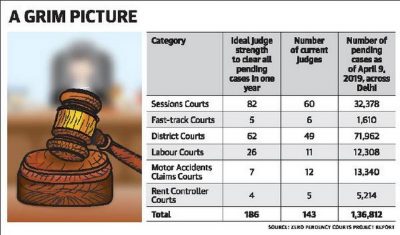Zero Pendency Courts Project 12/05/2019 – Posted in: Daily News
Zero Pendency Courts Project
For: Preliminary & Mains
Topics Covered: Aim & Objectives, Reasons for delay
News Flash
Delhi High Court has recently released a report that talks about the problem of increasing backlog and pendency of cases.
Aim
The ‘Zero Pendency Courts Project’ is a one-of-its-kind project in India aimed to study the life cycle of cases to come up with optimal timelines for cases.
Objectives of the Zero Pendency Courts Project
- To study the actual, real-time ‘Flow of Cases’ from the date of institution till final disposal.
- To identify the variables responsible for delays in disposal of cases.
- To assess realistic time lines needed for the final disposal of newly instituted cases relating to different jurisdictions.
Delhi High Court
- Prompted by the urgent need to ensure timely justice, the Delhi High Court started the pilot project from January 2017 in certain subordinate courts in Delhi.
- The report noted that the number of criminal cases in Delhi is far more than the number of civil cases.
- As on March 20, 2019, there were 5.5 lakh criminal cases and 1.8 lakh civil cases pending in subordinate courts in Delhi.
Report Suggestions
- It suggested bumping up the current strength of judges from 143 to an “ideal” 186 judges to clear all the pending cases in one year.
- The report said with persisting delays the system becomes less credible as litigants have to wait for decades to get their cases resolved.
- With an increase in the number of filings over the years, the pendency of cases is bound to increase if no proper targeted steps are taken to overcome the issue.
- It said the highest amount of time per hearing on average was spent on the final arguments stage followed by the final order or judgment.
- It was estimated that judicial delays cost India around 1.5% of its Gross Domestic Product annually.
Reasons for delays
- The absence of witnesses
- Missing evidence
- Unnecessary adjournments sought by the advocates or the parties
- Delay in the service of summons, especially to outstation parties.
- Lesser number of judges.
Source: The Hindu
You can follow us on LinkedIn and for more updates related to UPSC IAS Preparation, Like our Facebook Page and subscribe our Diligent IAS Youtube Channel
Also Read Related Daily News
- Global Assessment Report on Biodiversity and Ecosystem Services
- Genetic study on people of Lakshadweep Islands

